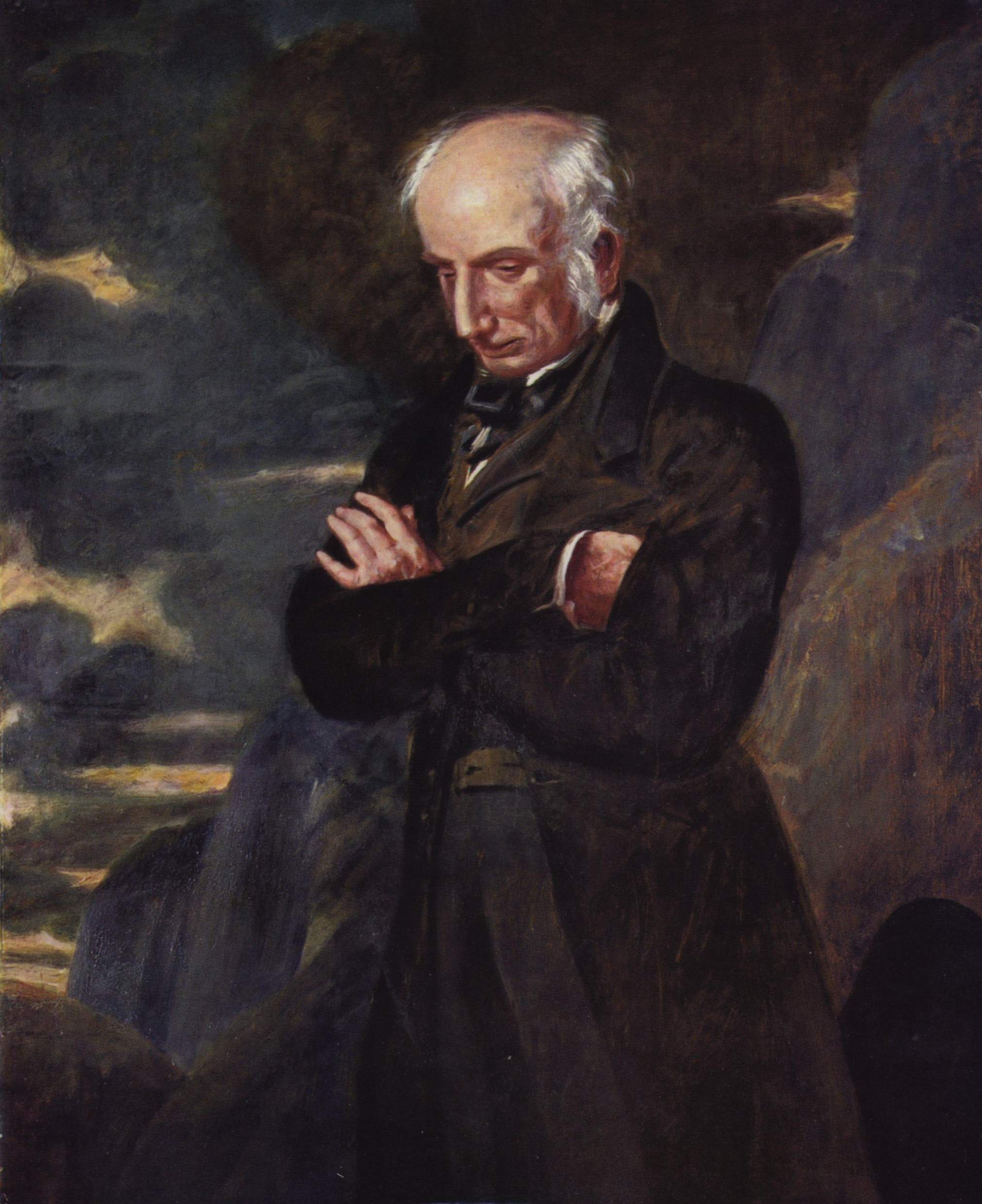“Los placeres recién descubiertos son dulces. Cuando mienten sobre nuestros pies.”
Fuente: To the Same Flower, capítulo 1 (1803).
William Wordsworth fue uno de los más importantes poetas románticos ingleses. Con Samuel Taylor Coleridge, contribuyó a la evolución de la época romántica en la literatura inglesa con su publicación conjunta de Baladas líricas en 1798. Esta obra influyó de modo determinante en el paisaje literario del siglo XIX. Fue el poeta laureado de Inglaterra desde 1843 hasta su muerte en 1850.
El carácter fuertemente innovador de su poesía, ambientada en el sugerente paisaje del Lake District , en el norte de Cumberland, radica en la elección de los protagonistas, personajes de humilde extracción, del tema, que es la vida cotidiana, y del lenguaje, sencillo e inmediato.
Wordsworth, Coleridge y Southey fueron conocidos como lakistas, por inspirarse en el mismo paisaje de los lagos.
Wikipedia

“Los placeres recién descubiertos son dulces. Cuando mienten sobre nuestros pies.”
Fuente: To the Same Flower, capítulo 1 (1803).
“Dulces dias infantiles, que eran siempre. Veinte días son ahora.”
Como una mariposa (I've Watched You Now a Full Half-Hour), sección. 2 (1801).
Fuente: http://www.gutenberg.org/browse/authors/w#a2879
“El arte es expresión de los sentimientos y emociones del artista.”
A Narrow Girdle of Rough Stones and Crags, l. 37 (1803).
Fuente: http://rpo.library.utoronto.ca/redirect/fromlink.cfm?new=poet/363.html
“As in the eye of Nature he has lived,
So in the eye of Nature let him die!”
The Old Cumberland Beggar.
Bartlett's Familiar Quotations, 10th ed. (1919)
Memorials of a Tour in Italy (1837), IV ("story" refers to History).
Personal Talk, Stanza 4.
Bartlett's Familiar Quotations, 10th ed. (1919)
The Triad.
Bartlett's Familiar Quotations, 10th ed. (1919)
“Minds that have nothing to confer
Find little to perceive.”
Yes, Thou art Fair, Yet Be Not Moved, st. 2 (1845).
“Sweet childish days, that were as long
As twenty days are now.”
To a Butterfly (I've Watched You Now a Full Half-Hour), st. 2 (1801).
“And, through the heat of conflict, keeps the law
In calmness made, and sees what he foresaw.”
Fuente: Character of the Happy Warrior http://www.bartleby.com/145/ww302.html (1806), Line 53.
“What is pride? A whizzing rocket
That would emulate a star.”
Inscriptions Supposed to be Found in and near a Hermit's Cell, l. 11 (1818).
Expostulation and Reply, st. 6 (1798).
Lyrical Ballads (1798–1800)
“A primrose by a river's brim
A yellow primrose was to him,
And it was nothing more.”
Part I, stanza 12.
Peter Bell (1798)
Sky-Prospect from the Plain of France.
Bartlett's Familiar Quotations, 10th ed. (1919)
Ode. Imagination before Content.
Bartlett's Familiar Quotations, 10th ed. (1919)
Stanza 7. http://books.google.com/books?id=pzgJAAAAQAAJ&q=%22Thou+dost+preserve+the+stars+from+wrong+And+the+most+ancient+heavens+through+Thee+are+fresh+and+strong%22&pg=PA73#v=onepage
Ode to Duty http://www.bartleby.com/145/ww271.html (1805)
Stanza 1.
Lyrical Ballads (1798–1800), Lines written a few miles above Tintern Abbey (1798)
Rob Roy's Grave, st. 9.
Memorials of a Tour in Scotland (1803)
“Lady of the Mere,
Sole-sitting by the shores of old romance.”
A Narrow Girdle of Rough Stones and Crags, l. 37 (1803).
“Be wise to-day; 'tis madness to defer.”
Actually Night I, line 390 of Edward Young's Night Thoughts.
Misattributed
Rob Roy's Grave, st. 5.
Memorials of a Tour in Scotland (1803)
Yarrow Visited.
Bartlett's Familiar Quotations, 10th ed. (1919)
“To the solid ground
Of Nature trusts the mind that builds for aye.”
A Volant Tribe of Bards on Earth.
Bartlett's Familiar Quotations, 10th ed. (1919)
Scorn not the Sonnet.
Bartlett's Familiar Quotations, 10th ed. (1919)
“Ten thousand saw I at a glance,
Tossing their heads in sprightly dance.”
Stanza 2.
I Wandered Lonely as a Cloud http://www.bartleby.com/145/ww260.html (1804)
Stanza 1.
She Was a Phantom of Delight http://www.bartleby.com/145/ww259.html (1804)
“One of those heavenly days that cannot die.”
Nutting.
Bartlett's Familiar Quotations, 10th ed. (1919)
“How blessings brighten as they take their flight!”
Occasionally misattributed to Wordsworth, but in fact by Edward Young again. It is from his Night Thoughts, Night II, line 602.
Misattributed